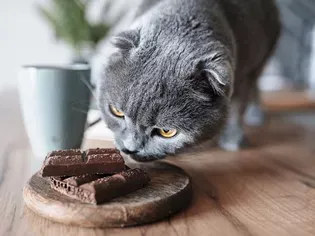Can Cats Eat Chocolate?
Updated on 04/26/24

Can Cats Eat Chocolate? The Ultimate Guide to a Feline's Sweet Spot
Introduction
Chocolate, that delectable treat that tantalizes our taste buds, can spark a longing in both humans and our beloved feline companions. However, as responsible pet owners, it's imperative to approach the question of whether cats can eat chocolate with caution. This comprehensive guide will delve into the complexities surrounding this topic, exploring the potential risks, alternative treats, and essential information needed to keep our furry friends safe.
The Bitter Truth: Why Chocolate is Bad for Cats
Chocolate contains a substance called theobromine, a compound also found in coffee and tea. While humans can metabolize theobromine without issue, cats lack the necessary enzyme to break it down effectively. As a result, even small amounts of chocolate can accumulate in a cat's system, leading to serious health complications.
Symptoms of Chocolate Toxicity in Cats
Ingestion of chocolate by cats can trigger a range of symptoms, varying in severity depending on the amount consumed:
* Vomiting
* Diarrhea
* Increased thirst and urination
* Panting
* Tremors
* Seizures
* Heart arrhythmias
* Respiratory failure
Types of Chocolate and Their Risks
Not all chocolates pose the same level of risk to cats. Dark chocolate, with its higher cacao content, contains significantly more theobromine than milk chocolate or white chocolate. However, even small amounts of any type of chocolate can be harmful to cats.
How Much Chocolate is Too Much?
The toxic dose of chocolate for cats varies depending on factors such as their weight, age, and individual sensitivity. As a general rule of thumb:
* 0.5 ounces of dark chocolate per pound of body weight can be fatal
* 1 ounce of milk chocolate per pound of body weight can cause serious illness
Alternatives to Chocolate
While chocolate may be off the menu for our feline companions, there are plenty of other treats that can satisfy their sweet tooth without posing any health risks:
* Catnip: This natural herb can provide a safe and enjoyable sensory experience for cats.
* Commercial cat treats: Specially formulated cat treats are designed to be palatable and nutritious for our furry friends.
* Fruit: Small amounts of pet-safe fruits, such as blueberries, strawberries, and bananas, can be an occasional treat.
Prevention is Key
To ensure the well-being of our cats, it's essential to prevent them from accessing chocolate. Keep all chocolate products out of reach, secure trash cans, and be vigilant when giving treats to guests.
Conclusion
While it may be tempting to share our chocolatey indulgences with our beloved cats, their safety and well-being must remain our top priority. By understanding the risks associated with chocolate toxicity and providing safe alternatives, we can ensure that our feline companions live long, healthy, and chocolate-free lives.
Explore More Pets

Cat Behavior Problems
How to Stop Aggression in Kittens

Long-Haired Cat Breeds
Siberian Cat: Breed Profile, Characteristics, & Care

Cat Behavior Problems
How to Stop Kittens From Scratching and Biting

Long-Haired Cat Breeds
Turkish Angora: Cat Breed Profile, Characteristics & Care

Basic Training
How to Socialize Your Kitten

Short-Haired Cat Breeds
Cute Pictures & Facts About Calico Cats & Kittens

Litter Box Training
Training Your Kitten to Use the Litter Box

Long-Haired Cat Breeds
10 Fun Facts About White Cats